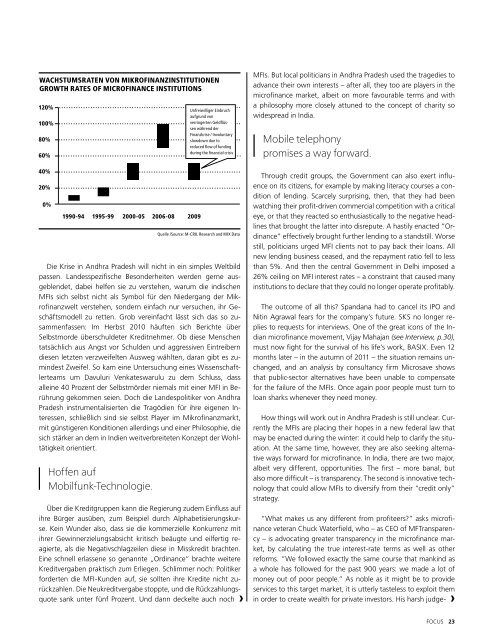FINANCE FOR ALL ? - Frankfurt School of Finance & Management
FINANCE FOR ALL ? - Frankfurt School of Finance & Management
FINANCE FOR ALL ? - Frankfurt School of Finance & Management
Sie wollen auch ein ePaper? Erhöhen Sie die Reichweite Ihrer Titel.
YUMPU macht aus Druck-PDFs automatisch weboptimierte ePaper, die Google liebt.
WachstumsRATEN VON Mikr<strong>of</strong>inanzinstitutionen<br />
GROWTH RATES OF Micr<strong>of</strong>inance institutions<br />
120% Unfreiwilliger Einbruch<br />
aufgrund von<br />
100%<br />
verringerten Geldflüssen<br />
während der<br />
Finanzkrise / Involuntary<br />
80%<br />
slowdown due to<br />
reduced flow <strong>of</strong> funding<br />
during the financial crisis<br />
60%<br />
40%<br />
20%<br />
0%<br />
1990-94 1995-99 2000-05 2006-08 2009<br />
Die Krise in Andhra Pradesh will nicht in ein simples Weltbild<br />
passen. Landesspezifische Besonderheiten werden gerne ausgeblendet,<br />
dabei helfen sie zu verstehen, warum die indischen<br />
MFIs sich selbst nicht als Symbol für den Niedergang der Mikr<strong>of</strong>inanzwelt<br />
verstehen, sondern einfach nur versuchen, ihr Geschäftsmodell<br />
zu retten. Grob vereinfacht lässt sich das so zusammenfassen:<br />
Im Herbst 2010 häuften sich Berichte über<br />
Selbstmorde überschuldeter Kreditnehmer. Ob diese Menschen<br />
tatsächlich aus Angst vor Schulden und aggressiven Eintreibern<br />
diesen letzten verzweifelten Ausweg wählten, daran gibt es zumindest<br />
Zweifel. So kam eine Untersuchung eines Wissenschaftlerteams<br />
um Davuluri Venkateswarulu zu dem Schluss, dass<br />
alleine 40 Prozent der Selbstmörder niemals mit einer MFI in Berührung<br />
gekommen seien. Doch die Landespolitiker von Andhra<br />
Pradesh instrumentalisierten die Tragödien für ihre eigenen Interessen,<br />
schließlich sind sie selbst Player im Mikr<strong>of</strong>inanzmarkt,<br />
mit günstigeren Konditionen allerdings und einer Philosophie, die<br />
sich stärker an dem in Indien weitverbreiteten Konzept der Wohltätigkeit<br />
orientiert.<br />
H<strong>of</strong>fen auf<br />
Mobilfunk-Technologie.<br />
Quelle /Source: M-CRIL Research and MIX Data<br />
Über die Kreditgruppen kann die Regierung zudem Einfluss auf<br />
ihre Bürger ausüben, zum Beispiel durch Alphabetisierungskurse.<br />
Kein Wunder also, dass sie die kommerzielle Konkurrenz mit<br />
ihrer Gewinnerzielungsabsicht kritisch beäugte und eilfertig reagierte,<br />
als die Negativschlagzeilen diese in Misskredit brachten.<br />
Eine schnell erlassene so genannte „Ordinance“ brachte weitere<br />
Kreditvergaben praktisch zum Erliegen. Schlimmer noch: Politiker<br />
forderten die MFI-Kunden auf, sie sollten ihre Kredite nicht zurückzahlen.<br />
Die Neukreditvergabe stoppte, und die Rückzahlungsquote<br />
sank unter fünf Prozent. Und dann deckelte auch noch<br />
MFIs. But local politicians in Andhra Pradesh used the tragedies to<br />
advance their own interests – after all, they too are players in the<br />
micr<strong>of</strong>inance market, albeit on more favourable terms and with<br />
a philosophy more closely attuned to the concept <strong>of</strong> charity so<br />
widespread in India.<br />
Mobile telephony<br />
promises a way forward.<br />
Through credit groups, the Government can also exert influence<br />
on its citizens, for example by making literacy courses a condition<br />
<strong>of</strong> lending. Scarcely surprising, then, that they had been<br />
watching their pr<strong>of</strong>it-driven commercial competition with a critical<br />
eye, or that they reacted so enthusiastically to the negative headlines<br />
that brought the latter into disrepute. A hastily enacted “Ordinance”<br />
effectively brought further lending to a standstill. Worse<br />
still, politicians urged MFI clients not to pay back their loans. All<br />
new lending business ceased, and the repayment ratio fell to less<br />
than 5%. And then the central Government in Delhi imposed a<br />
26% ceiling on MFI interest rates – a constraint that caused many<br />
institutions to declare that they could no longer operate pr<strong>of</strong>itably.<br />
The outcome <strong>of</strong> all this? Spandana had to cancel its IPO and<br />
Nitin Agrawal fears for the company’s future. SKS no longer replies<br />
to requests for interviews. One <strong>of</strong> the great icons <strong>of</strong> the Indian<br />
micr<strong>of</strong>inance movement, Vijay Mahajan (see Interview, p.30),<br />
must now fight for the survival <strong>of</strong> his life’s work, BASIX. Even 12<br />
months later – in the autumn <strong>of</strong> 2011 – the situation remains unchanged,<br />
and an analysis by consultancy firm Microsave shows<br />
that public-sector alternatives have been unable to compensate<br />
for the failure <strong>of</strong> the MFIs. Once again poor people must turn to<br />
loan sharks whenever they need money.<br />
How things will work out in Andhra Pradesh is still unclear. Currently<br />
the MFIs are placing their hopes in a new federal law that<br />
may be enacted during the winter: it could help to clarify the situation.<br />
At the same time, however, they are also seeking alternative<br />
ways forward for micr<strong>of</strong>inance. In India, there are two major,<br />
albeit very different, opportunities. The first – more banal, but<br />
also more difficult – is transparency. The second is innovative technology<br />
that could allow MFIs to diversify from their “credit only”<br />
strategy.<br />
“What makes us any different from pr<strong>of</strong>iteers?” asks micr<strong>of</strong>inance<br />
veteran Chuck Waterfield, who – as CEO <strong>of</strong> MFTransparency<br />
– is advocating greater transparency in the micr<strong>of</strong>inance market,<br />
by calculating the true interest-rate terms as well as other<br />
reforms. “We followed exactly the same course that mankind as<br />
a whole has followed for the past 900 years: we made a lot <strong>of</strong><br />
money out <strong>of</strong> poor people.” As noble as it might be to provide<br />
services to this target market, it is utterly tasteless to exploit them<br />
in order to create wealth for private investors. His harsh judge-<br />
FOCUS<br />
23


